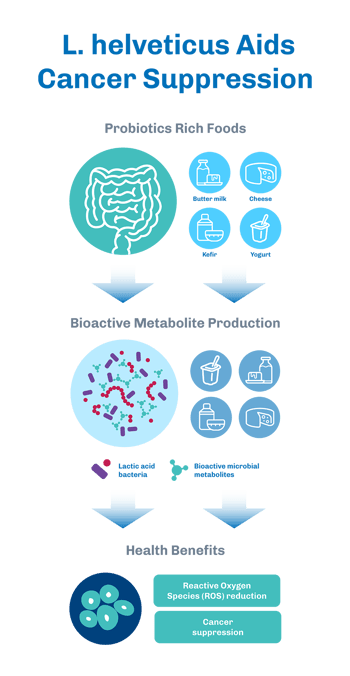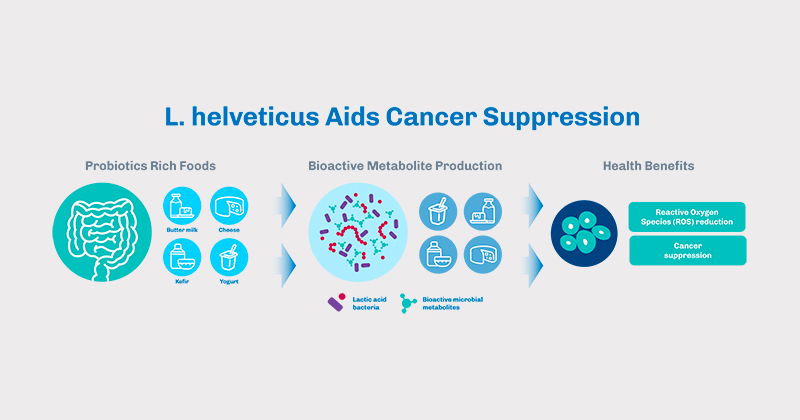L.helveticus is a lactic acid bacteria (LAB) normally found in the gut. It can also be found naturally in foods such as cheese, milk, and fermented products. This probiotic has been linked with several health benefits like improving gut health, decreasing blood pressure, treatment of gut infections, and cancer including gastric and colon cancer.
L.helveticus in natural products has anti-cancer properties
There is substantial evidence that a diet rich in cultured dairy products may inhibit the growth of several types of cancer. For instance, colon cancer in animals was found to be inhibited by a diet containing lactobacilli and yogurt. Therefore, aside from nutritional value, milk, cheese, and other fermented products also contribute antioxidant and anticancer properties.
How does L.helveticus help in cancer suppression?
 When cells are under stress, they form Reactive Oxygen Species (ROS). High ROS levels are usually associated with cancer. During fermentation, probiotics such as L.helveticus secrete enzymes that could degrade the proteins that are present in dairy. The degradation products are called bioactive metabolites that contribute to ROS reduction and cancer suppression.
When cells are under stress, they form Reactive Oxygen Species (ROS). High ROS levels are usually associated with cancer. During fermentation, probiotics such as L.helveticus secrete enzymes that could degrade the proteins that are present in dairy. The degradation products are called bioactive metabolites that contribute to ROS reduction and cancer suppression.
Moreover, the fermentation process results in the production of organic acids which causes the pH to drop. Because L.helveticus is stable at this low pH, it remains active even in acidic conditions. A study has shown that the extent of colon cancer suppression is highest when they used the skim milk supernatant at the end of fermentation (12 hours). They also showed that the suppression is significant only in cancer cells and not in normal cells.
Another study demonstrated that milk fermented with L. helveticus decreases the growth rate of mammary tumors in mice. Tumors are considered to arise as a result of an imbalance between cancer cell proliferation and cancer cell death. In their study, they found that the effect was mediated by increased apoptosis (cell death). There was also a decreased production of pro-inflammatory cytokines such as IL-6 which is implicated in estrogen synthesis. This implies that there is a reduction of stress (tumor) experienced by the mice.
Furthermore, exopolysaccharides that are derived from L.helveticus were found to significantly inhibit colon cancer cell proliferation in a time- and concentration-dependent manner. This was also the case when they used the purified exopolysaccharide with gastric cancer cells.
Conclusion
Foods rich in probiotics such as L.helveticus provide several health benefits. Among others, cancer is one of the major causes of death worldwide and is found to be inhibited by the metabolites produced by L.helveticus. Studies on the effect of several probiotics including L.helveticus on different types of cancer are currently underway. Nevertheless, previous results imply that a probiotic-rich diet may reduce the risk of cancer and may inhibit cancer cell proliferation.
References:
- https://www.ncbi.nlm.nih.gov/pmc/articles/PMC3500876/
- https://www.ncbi.nlm.nih.gov/pubmed/16093403
- http://www.ncbi.nlm.nih.gov/pmc/articles/PMC4081610/
- https://www.healthline.com/health/lactobacillus-helveticus
- https://pubmed.ncbi.nlm.nih.gov/26601580/#:~:text=Lactobacillus%20helveticus%201315%20released%20compounds,normal%2C%20primary%20colon%20cells%20T4056
- https://pubs.rsc.org/en/content/articlelanding/2020/fo/d0fo01345e/unaut



